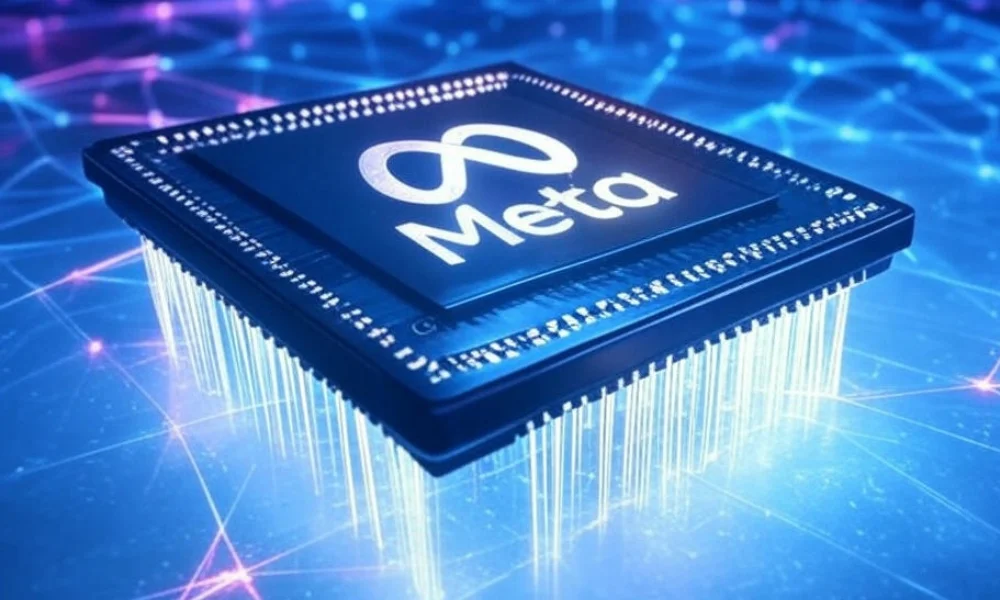Artificial Intelligence
Meta’s AI Chip Breakthrough: Pioneering Custom Silicon for the Future of AI
Meta’s AI chip testing marks a bold step toward custom silicon, aiming to power smarter AI for its platforms while cutting reliance on NVIDIA. Unveiled on March 11, 2025, this move could reshape U.S. tech innovation and the future of artificial intelligence.

Technology company Meta enters the artificial intelligence chip manufacturing sector as the parent organization to Facebook and Instagram. The day March 11th of 2025 marked the realization of their vision. Meta officially started testing its first in-house Meta AI chip designed for AI training hardware. This strategic shift reduces reliance on NVIDIA competition and strengthens U.S. tech infrastructure. More than a cost-cutting move, this innovation positions Meta at the forefront of domestic AI production.
What is Meta’s AI Chip?
Meta’s AI chip is a custom silicon processor built to power AI applications. Unlike traditional GPUs, it focuses on AI innovation, optimizing performance for Meta’s platforms. With this move, Meta signals a shift in tech industry trends, emphasizing control, efficiency, and self-reliance.
Announcement and Its Timing: Why Now?
Meta’s decision to conduct AI chip testing does not happen by chance. The news broke at a time when the White House started charging a 25% tariff on steel and aluminum imports thus driving up expenses for companies that operate with global supply chains. The growing expenses of external suppliers including NVIDIA become a challenge for Meta as it continues to invest in AI development for Instagram and Reels and the metaverse.
By developing in-house AI training hardware, Meta ensures cost control, performance gains, and long-term dominance. This Meta strategy isn’t just about hardware, it’s about shaping the future of AI.
Meta’s AI Chip: What Makes It Different?
Meta’s custom silicon prioritizes AI efficiency over general computing power. While exact specifications remain undisclosed, experts suggest its design focuses on:
-
Neural network processing for machine learning efficiency.
-
High-bandwidth memory to manage vast data streams.
-
Energy optimization to reduce operational costs.
Unlike NVIDIA competition, which offers general-purpose GPUs, Meta’s chip integrates seamlessly into its software ecosystem. If successful, this innovation could reshape AI performance across Meta’s platforms.
How Will Meta’s AI Chip Impact the Company?
Developing a Meta AI chip is a financial and strategic game-changer. Relying on third-party AI training hardware has cost Meta billions, creating supply chain vulnerabilities. By switching to custom silicon, Meta could:
-
Reduce operational costs, freeing resources for future innovations.
-
Optimize AI-driven features, such as real-time content moderation.
-
Enhance AR and VR experiences, making the metaverse more immersive.
However, this move isn’t risk-free. Developing AI training hardware demands massive R&D investments. If the chip fails to meet expectations, Meta could face setbacks in its AI ambitions.
Will Meta Challenge NVIDIA in the AI Market?
Meta’s decision to create its own AI training hardware is a direct challenge to NVIDIA competition. NVIDIA has dominated AI computing, supplying essential GPUs to tech giants. With Meta’s entry into custom silicon, the market dynamic shifts.
Other companies, including Google and Amazon, have developed proprietary chips, and now Meta joins the trend. If Meta successfully integrates its chip into its ecosystem, it could influence:
-
Chip pricing strategies across the industry.
-
AI hardware customization trends for specialized applications.
-
Tech infrastructure investments in the United States.
U.S. Tech Infrastructure and Domestic AI Production: What’s Changing?
Meta’s AI innovation aligns with a broader push for domestic AI production. The U.S. government emphasizes reducing reliance on foreign technology, particularly amid increasing geopolitical tensions. Recent policy shifts, including tariffs on imported tech components, make self-sufficiency more critical than ever.
By investing in custom silicon, Meta supports the U.S. goal of leading global AI advancements. This initiative could:
-
Encourage American semiconductor manufacturing.
-
Reduce dependence on international chip suppliers.
-
Strengthen U.S. tech infrastructure against supply chain disruptions.
What’s Next for Meta’s AI Chip Strategy?
Testing is just the first step. Meta must now:
-
Validate performance through extensive trials.
-
Scale production to support its AI-driven platforms.
-
Roll out deployment across data centers by 2026-2028.
Could Meta expand further? There’s speculation that Meta might license its AI chip to other companies or enter the semiconductor market. If so, this shift could disrupt existing tech industry trends and introduce new competition in AI hardware.
Conclusion:
Custom AI chip developed by Meta represents an important industrial milestone. The innovation enables Meta to decrease its expenses and deliver superior performance while becoming self-sufficient from NVIDIA. Additionally, it supports U.S. tech infrastructure, aligning with national AI priorities.
The technology sector maintains its keen observation regarding Meta’s AI chip development because it may transform how AI training and hardware operate. Do you approve of this decision? Join the ongoing discussion by sharing your opinions about the matter.
-

 Artificial Intelligence8 months ago
Artificial Intelligence8 months agoWhat is Artificial Intelligence? A Comprehensive Guide for Businesses and Enthusiasts
-

 Artificial Intelligence6 months ago
Artificial Intelligence6 months agoHow to Use Grok AI: A Complete Guide
-

 Artificial Intelligence8 months ago
Artificial Intelligence8 months agoUnlocking the Power of Artificial Intelligence Tools
-

 Artificial Intelligence7 months ago
Artificial Intelligence7 months agoWhat is DeepSeek? Revolutionizing AI with Cutting-Edge Solutions
-

 Artificial Intelligence3 months ago
Artificial Intelligence3 months agoAI Technologies in Warehouse Automation:
-

 Artificial Intelligence4 months ago
Artificial Intelligence4 months agoMeta’s AI Push: The Standalone Assistant App Set to Rival ChatGPT
-

 Artificial Intelligence3 months ago
Artificial Intelligence3 months agoHow Artificial Intelligence is Revolutionizing Logistics:
-

 Artificial Intelligence3 months ago
Artificial Intelligence3 months agoPredictive Analytics for Demand Forecasting:


